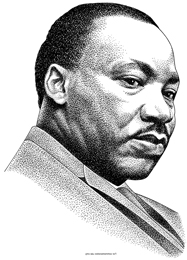Dare To Dream — Martin Luther King Jr. 1929-1968
 A look at the life and influence of Dr. King
A look at the life and influence of Dr. King
Martin Luther King, Jr. played a pivotal role in race relations in the United States for nearly a decade. He helped secure the end of legal segregation of African-American citizens, created the Civil Rights Act of 1964 and served as a source of inspiration for black individuals across the globe.
Dr. King did not begin his life as a crusader or public figure. He had much more modest beginnings in rural Atlanta. Born Michael King, Jr., he was the middle child of Michael King, Sr. and Alberta Williams King. Michael King, Sr. served as pastor of Ebenezer Baptist Church upon the death of his father-in-law, who was the church’s prior pastor. At this point, the elder king decided to change his name to Martin Luther to honor the famed Protestant religious leader. His son soon decided to adopt the name as well.
A religious family, the Kings tried to shield their children from the realities of racism that were alive and well in the country. They believed racism and segregation to be an affront to God’s will, and Martin, Sr. discouraged separation of class and taught these lessons to his children. Those lessons resonated with Martin, Jr.
Dr. King attended Booker T. Washington High School and was so advanced he was able to skip both the 9th and 11th grades. He went on to college at the age of 15, graduating from Morehouse College in 1948 with a degree in sociology. In his junior year of college, King enrolled in a Bible class that sparked a renewed enthusiasm for the ministry. He later enrolled in the liberal Crozer Theological Seminary in Chester, Pennsylvania, where he received a Bachelor’s of Divinity. Later he attended Boston University and earned a Ph.D. at the age of 25. It was during his time in Boston that he met his future wife, Coretta Scott. While he was completing his dissertation work, Dr. King became the pastor for the Dexter Avenue Baptist Church of Montgomery, Alabama.
Martin Luther King, Jr. became directly involved in the civil rights movement after the head of the local NAACP chapter in Montgomery met with him on the night that Rosa Parks was arrested for failure to give up her bus seat to a white passenger. Dr. King helped institute the Montgomery Bus Boycott. During this time, African-Americans refused to ride the public bus system in Montgomery. The boycott lasted 382 days. During that time, Dr. King’s home was bombed due to his involvement in the boycott, and he was arrested for conspiracy. His work paid off on December 21, 1956, when the Supreme Court ruled that racial segregation on public transportation was illegal.
Dr. King promoted nonviolent protests against unfairness to the African-American community, urging civil disobedience and peaceful protests, tenets that formed the basis for the Southern Christian Leadership Conference, or SCLC, which he led. He participated in numerous nonviolent protests and was arrested several times. During one stint in jail, he penned his famous, “Letter from a Birmingham Jail.”
Dr. King established a relationship with fellow African-American civil rights activist Bayard Rustin, who shared similar interests, including the teachings of Gandhi. Rustin would serve as King’s mentor and also was the main organizer of the March on Washington that took place on August 28, 1963. Approximately 250,000 demonstrators were involved in the march, and it was the largest demonstration in the nation’s capital up to that time. In front of the Lincoln Memorial, Dr. King issued his famed “I Have a Dream” speech. He later met with President John F. Kennedy to appeal for greater rights for African-Americans and called for an end of segregation.
As a result of his civil rights efforts, Dr. King was awarded the Nobel Peace Prize on December 10, 1964, at the age of 35. He was the youngest person ever to receive the honor. He donated all of the prize money to his racial equality effort.
Through the late 1960s, Dr. King expanded his Civil Rights Movement to other cities. But he was often met with criticism, especially when he appealed to white middle-class citizens. Many militant black organizations considered King’s methods too weak and ineffective. His support was faltering and Dr. King grew weary of marches, jail and protests. However, in April of 1968, a labor strike in Memphis drew King’s attention, and he gave a speech about the sanitation labor dispute, which would prove to be prophetic. The next day, on April 4, Dr. King was hit by a sniper’s bullet while standing on an outside terrace of his motel room at the Lorraine Motel. King’s words from the previous day, including, “I’ve seen the promised land. I may not get there with you. But I want you to know tonight that we, as a people, will get to the promised land,” were haunting. James Earl Ray was charged with the assassination.
In his honor, Americans have celebrated Martin Luther King, Jr. Day as a federal holiday since 1986. King was posthumously awarded the Presidential Medal of Freedom in 1977. Many streets have been renamed in his honor, and Dr. King remains a source of inspiration decades after his death.



























